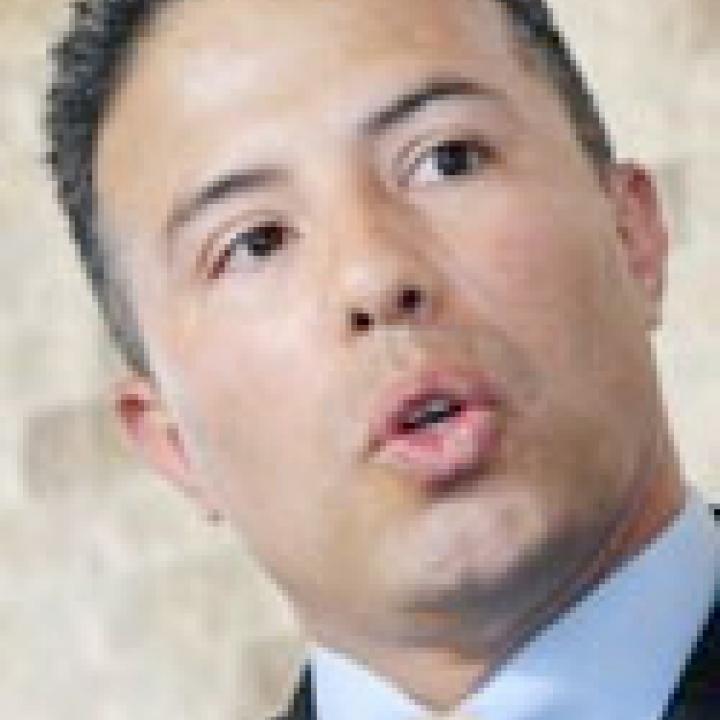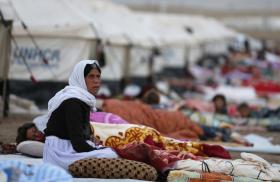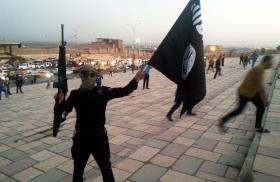
- Policy Analysis
- Counterterrorism Lecture
Counterterrorism Operations in FBI Los Angeles: Collaboration and Teamwork

Part of a series: Counterterrorism Lecture Series
or see Part 1: U.S. Efforts against Terrorism Financing: A View from the Private Sector
How is the FBI working to defend the U.S. West Coast against the evolving global terrorist threat?
Steven L. Gomez, special agent in charge of counterterrorism in the FBI's Los Angeles field office, addressed The Washington Institute as part of the ongoing lecture series sponsored by the Stein Program on Counterterrorism and Intelligence. The following are his prepared remarks.
Protecting the United States against a terrorist attack is the FBI's number one priority. The Counterterrorism Division of the Los Angeles Field Office (LAFO) in particular is responsible for protecting more than 19 million people by preventing all acts of terrorism within its area of responsibility -- seven counties that comprise 26 percent of California's total area, including the most populated county in the country (Los Angeles) and the largest county in the country (San Bernardino). Teamwork and collaboration among federal, state, local, and community partners play a critical role in LAFO's ability to successfully carry out its counterterrorism mission.
LAFO's Joint Terrorism Task Force (LA JTTF) is the primary vehicle for addressing all threats of terrorism, conducting counterterrorism operations, and building diversified relationships to accomplish the mission. The JTTF relies on the concept of merging personnel and expertise from diverse law enforcement, public safety, and intelligence agencies into one agile investigative and operational team. This means FBI Special Agents and Task Force Officers (TFOs) from participating agencies are collocated to facilitate teamwork and collaboration and to perform their mission while protecting the civil liberties of the citizens they protect.
Considering the breadth of LAFO's territory, the LA JTTF's greatest challenge is to detect, deter, and prevent any act of terrorism connected to individuals or entities in the 44,000 square miles we cover. To meet this challenge, the LA JTTF is structured in a manner that enables a quick and effective response to any threat of terrorism or suspicious activity anywhere in LAFO's territory due to their location and specialized focus. Investigative teams are located throughout the seven counties and each focuses on addressing a particular terrorism group or issue. Specifically, more than ten squads focus on terrorism groups (e.g., al-Qa'ida, Hizballah, left-wing domestic extremists, and right-wing domestic extremists) and a few focus on specific terrorism issues (e.g., threats, critical infrastructure, terrorism financing, and extraterritorial matters).
LAFO's Threat Squad is the first responder in the FBI's effort to address the hundreds of terrorism tips and leads we receive each month. The squad is responsible for investigating all call-in complaints, tips from local police departments, and leads from citizens related to potential terrorism or terrorism-related suspicious activity. Key partners on this squad include investigators from the Los Angeles Police Department (LAPD), Los Angeles Sheriff's Department (LASD), and Orange County Sheriff's Department. The Threat Squad typically operates by responding to tips where very little information is available. Under these circumstances, the Threat Squad uses the full scope of the FBI's investigative and intelligence gathering apparatus to determine if a tip or lead is worth pursuing. If so, the appropriate resources are applied to determine if a tip is unfounded, has merit and requires an investigative response, or does not involve an imminent threat but requires further investigation. In the latter instance, the lead is passed to the appropriate JTTF investigative team to open a case and conduct all logical investigative steps. This system allows the LA JTTF to mobilize a certain set of resources to operate in a reactive manner and prevents the bulk of the JTTF squads from having to drop everything each time a threat lead is received.
The Infrastructure Squad focuses on private industries in the Los Angeles area that are of most concern from a critical infrastructure/key resource perspective. Partners on this squad include investigators from the Coast Guard, Long Beach Police Department, Los Angeles Port Police Department, Los Angeles Airport Police Department, LAPD, and U.S. Secret Service. Due to the overall terrorism threat and prior plots involving these industries both nationally and worldwide, it is imperative to have an investigative team that knows everything about each industry's procedures, the threat and vulnerabilities associated with that industry, and the security measures in place to guard that industry from a terrorist attack. Of high importance to this squad is developing and maintaining strong liaison relationships with the law enforcement and private sector partners in the aviation, seaport, and rail industries, not only to ensure effective security measures are in place, but also in the event an incident does occur.
The Terrorism Financing Operations Squad (TFOS) plays a critical role in LAFO's terrorism investigations and includes agents from the Internal Revenue Service and Drug Enforcement Administration. Squad members are experts in white collar crime matters and are proficient at investigating criminal activity within the United States and internationally. These skills are necessary to successfully accomplish TFOS's two-part mission. First, squad personnel serve as consultants to all of the JTTF squads with respect to money movement and financing issues encountered during routine terrorism cases. Second, the TFOS squad conducts independent investigations on individuals who are engaged in fundraising and materially supporting individuals involved in terrorism activity.
The Extraterritorial Squad is responsible for investigating terrorism threats and crimes against U.S. persons and interests in South East Asia. Key partners include personnel from the LAPD, LASD, and Department of Defense-Pacific Command. All of this squad's cases involve conducting investigations in other parts of the world, which requires working in collaboration with foreign counterparts, the appropriate U.S. Ambassador, and country team agencies present wherever investigative efforts are required. Personnel from this squad and executive management from the LA JTTF spend a significant amount of time meeting with foreign counterparts to develop effective working relationships that support international investigative efforts. In some cases, training is provided to foreign partners in their respective country; other times, training is hosted for foreign delegations in the Los Angeles area. The international investigations conducted and the relationships developed and maintained are critical to the FBI's mission to prevent and respond to acts of terrorism not only in the U.S. but worldwide.
The teamwork and collaboration accomplished within and by individual JTTF squads is supplemented by the relationship the LA JTTF as a whole has established with the Joint Regional Intelligence Center (JRIC) -- a multi-agency regional intelligence fusion center based in Norwalk, California. The JRIC shares relevant terrorism-related intelligence and requests for information with private sector entities as well as law enforcement and public safety agencies that are not members of the JTTF. This information sharing environment, led by the JRIC, enables the LA JTTF to reach every law enforcement and public safety agency, in addition to key private sector partners, with information on what terrorism-related suspicious activity to look for and how to report the information for action by the JTTF.
To enhance the JRIC's private and public sector outreach efforts, the FBI's Intelligence Division has Special Agents and Intelligence Analysts assigned to the JRIC. The Intelligence Division's personnel in collaboration with the JRIC, also manage and support the Terrorism Liaison Officer (TLO) and Infrastructure Liaison Officer (ILO) programs. In both programs, personnel interested in serving as liaison officers receive baseline training on two key elements: what constitutes terrorism-related suspicious activity and where to report such activity when they discover it. The TLO program is for personnel from law enforcement, fire, and health departments. The ILO program is for individuals from private industry. The TLO and ILO programs have been highly successful in providing the LA JTTF with an educated set of eyes and ears throughout the community, leveraging LAFO's ability to address criminal activity and suspicious behavior that may indicate terrorism activity. The JRIC receives and processes information provided by TLOs and ILOs, then provides it to the JTTF's Threat Squad for review. This process ensures information from TLOs and ILOs makes it to the LA JTTF for review and action. We're asking our public safety and private industry partners for input, and we're listening to what they tell us.
In addition to the LA JTTF's broad presence in LAFO territory, specialized squads, and partnership with the JRIC, we also engage in community outreach to further enhance the counterterrorism mission. This outreach includes interaction with business groups, non-profit enterprises, religious institutions, educational organizations, and other non-government entities. Such outreach has been very successful in building relationships based on trust and respect, educating outreach partners on how the FBI conducts business, and involving the community in the development of strategies to accomplish the counterterrorism mission.
To paraphrase Henry Ford, coming together is a beginning, keeping together is progress, and working together is success. This sentiment is exemplified by the extent to which private sector, local, state, and federal partners have come together, progressed collaboratively toward a common goal, and continue to work as a unified team with diverse perspectives to successfully protect our community from a terrorist attack.





